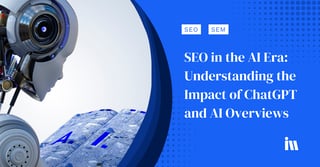SEO in the AI Era: Understanding the Impact of ChatGPT and AI Overviews

Search Engine Optimization (SEO) has always been the backbone of digital marketing strategies. With every algorithm update and technological evolution, businesses have had to adjust their game plans to maintain visibility and secure a slice of the search engine traffic pie. But now, the rise of artificial intelligence (AI)—and tools like ChatGPT—is rewriting the fundamental dynamics of organic search.
Here’s the reality we’re facing today: the number one ranking on Google’s search results page is no longer the goldmine it used to be. Organic clicks across many industries are dropping, and AI-driven answers are playing a leading role in diverting that attention.
Are these changes simply a hurdle for businesses, or are they an opportunity to think beyond traditional SEO strategies? The answer lies in adapting. This article will outline how AI is impacting SEO, provide data-backed insights into these trends, and propose actionable solutions to help your business thrive in the new landscape of organic search.
The Decline of Organic Clicks
A Shift in User Behavior
For years, achieving the number one ranking on Google was synonymous with success on search engines. However, recent data shows that those coveted top spots aren’t driving as many clicks as they once did. Why? The answer lies in evolving user behavior. Searchers today expect answers in seconds, and AI tools like ChatGPT, Google’s Bard, and Bing AI are delivering concise, conversational responses that meet those expectations directly on the results page. This trend is amplified by zero-click searches, as users increasingly find the information they need via Google’s rich snippets, knowledge panels, or AI chatboxes, without clicking through to websites
The Role of AI-Powered Search Features
AI is reshaping how search engines display results. From auto-generated summaries to predictive search results, these features provide immediate answers to users’ queries. While this improves the user experience, it also means fewer clicks are funneled to website links traditionally ranked at the top.
What emerges is a vital question for content creators and businesses depending on SEO strategies for growth: How can you capture attention and maintain relevance in the AI era of search?
How AI is Reshaping SEO
To adjust to the rise of AI in search engines, we need to rethink SEO strategies not as an outdated playbook but as a constantly evolving set of tools.
Here are the key ways AI is transforming the SEO landscape:
-
Content Summarization: AI algorithms embedded in search engines now pull key points from web pages to generate summaries directly in search result pages (SERPs). While useful for users, this poses a challenge for businesses reliant on organic click-throughs because most traffic gets absorbed at the search result stage.
- Conversational Queries: AI-powered tools like ChatGPT mimic human interactions, answering long-tail or complex conversational queries that traditional search struggled to address. This shift reduces reliance on visiting multiple websites by consolidating information into more accessible formats.
- Competitive Keyword Saturation: AI can surface intensely specific insights from vast data pools, leading to altered keyword behaviors that make high-competition keywords harder to dominate. It’s no longer about appearing at the top of a search—instead, success means being part of the AI-curated conversation.
- Content Personalization: AI and machine learning can tailor content recommendations to individual users. Personalized SEO strategies are now critical, as the “one-size-fits-all” approach to organic content won't suffice fast evolving user personas.
Adapting SEO Strategies for the AI Era
- Optimize for Featured Snippets: Understanding how to optimize for Google’s featured snippets is a make-or-break skill in the emerging SEO environment. Structure your content to answer direct queries concisely while also offering extended insights to draw users in if they click through.
- Focus on Stronger Long-Tail Keywords: AI-driven conversational tools prioritize complex, natural-language search phrases. Create content that addresses longer, highly specific searches to capture users who turn to these tools for nuanced or contextual answers.
- Be AI-Friendly: Structure your webpage data with schema markup. This improves how AI and search engine crawlers “understand” your content, increasing the chance that your information will surface in AI-generated search results.
- Prioritize Depth Over Breadth: Shallow, thin content will no longer get you traffic. Invest in creating in-depth, valuable, and evergreen content that AI tools consider credible enough to extract and summarize.
- Leverage AI for Content Creation: Instead of viewing AI as competition, treat it as an ally. Use tools like ChatGPT for brainstorming, outlining, and enhancing your content. AI can help improve efficiency and refine your messaging, ensuring it aligns with the preferences of search algorithms.
- Measure What Matters: Track shifts in click-through rates (CTR) and analyze how AI impacts your audience’s interaction with search results. Use tools like Google Analytics and AI-driven SEO platforms to measure where your organic strategy is losing traction and adapt accordingly.
Taking these steps will help your brand remain visible and relevant in a landscape dominated by AI-enhanced search.
Looking Ahead
The relationship between SEO and AI is symbiotic. While AI is undoubtedly shaking up traditional organic search practices, it also presents opportunities for innovative brands willing to think differently and stay ahead of the curve.
Adopting the mindset that AI challenges create new growth avenues is essential. These transformations call for businesses to double down on transparent, in-depth, and user-focused content while staying agile as the landscape continues to evolve.

